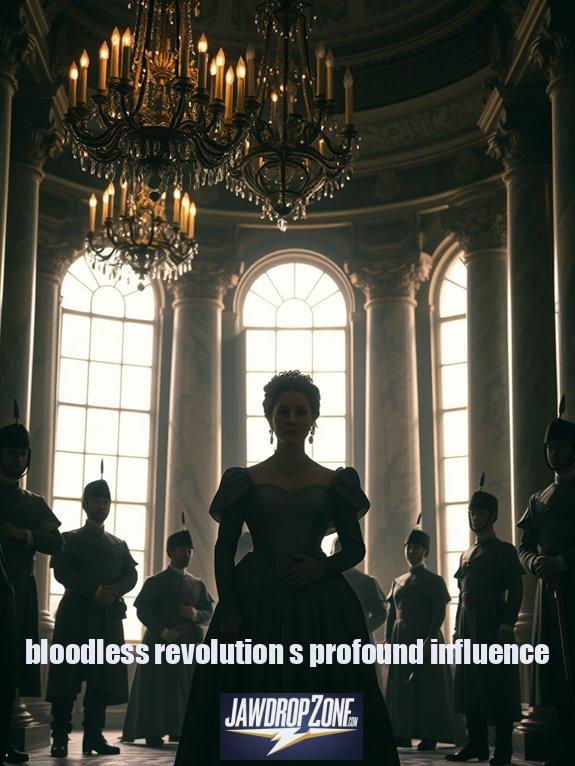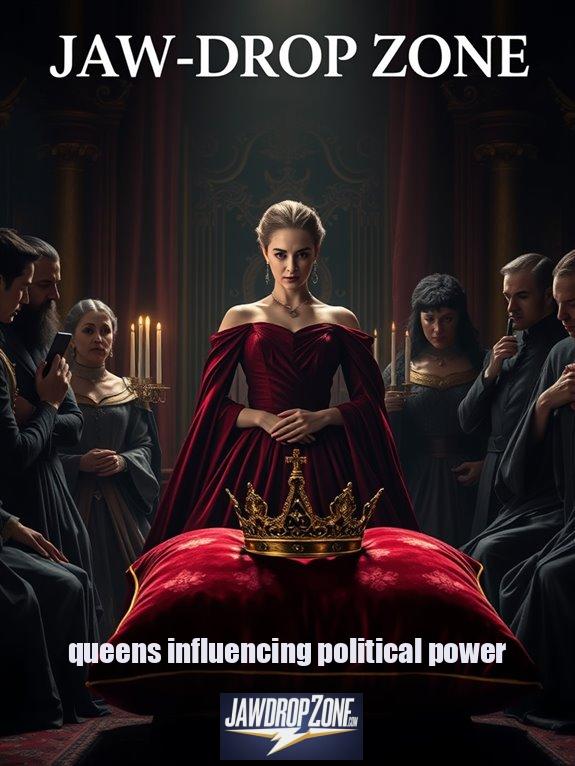Elizabeth’s secret 1741 palace revolution took the world by storm! Envision a royal with a solid claim to the throne, rallying popular support against an indecisive regent while effortlessly charming military backing. Shockingly, it all unfolded without a single drop of blood spilled! Talk about a masterclass in political finesse. Who knew coup d’états could be so stylish? If you think that’s intriguing, brace yourself for more jaw-dropping tales of power play.
Quick Takeaways
- Elizabeth leveraged her lineage as Peter the Great’s daughter, providing a strong claim to the throne and legitimacy for her rule.
- Discontent with high taxes and a weak regency fostered widespread popular support for Elizabeth’s coup.
- Her strategic use of hunger strikes showcased civil disobedience and inspired public sacrifice for political change.
- The backing of the Preobrazhensky Life Guards ensured military support, crucial for a successful coup.
- The bloodless nature of the revolution created stability and a positive public image, enhancing her leadership’s longevity.
Key Factors Leading to Elizabeth’s Successful Coup

When you think of a coup, do you picture chaotic battles, smoke, and bloodshed? Think again! Elizabeth’s 1741 revolution was a masterclass in strategic finesse.
Envision a scenario where she, the legitimate heir born of Peter the Great, taps into popular support that’s simmering under the surface. People were fed up with high taxes and an indecisive regency under Anna Leopoldovna. The use of hunger strike tactics by suffragettes in later movements reflected the power of civil disobedience, showcasing how personal sacrifice can provoke change.
She had the Preobrazhensky Life Guards on her side—ready to act, effectively turning the Winter Palace into her stage. Would you believe this coup unfolded without a single drop of blood? Now that’s a plot twist worth watching!
Foreign ambassadors were itching to change the political game, applying external pressure. Elizabeth, a savvy negotiator, danced her way through it all, leveraging discontent among the nobility and setting the stage for a seamless changeover.
The stars aligned, and the rest, as they say, is history. Isn’t history just jaw-dropping?
The Impact of a Bloodless Revolution on Elizabeth’s Reign

Conceive a palace where power simply shifts hands without a single sword drawn, a scene so surreal you’d think it was plucked from a fairytale rather than a historical event.
Elizabeth’s bloodless revolution wasn’t just remarkable; it was revolutionary!
Picture this: chaos quelled by a strategic charm offensive, with the Preobrazhensky Guards not just standing by, but rallying behind her.
Isn’t it astounding how stability can flourish without violence?
Isn’t it remarkable how tranquility can thrive in a world where conflict is absent?
This peaceful change allowed Elizabeth to focus on governance, ensuring she wouldn’t sign death warrants—quite the shocker in a world of blood-soaked power grabs!
Her virtuous image catapulted her into public favor, and let’s not forget her reputation bolstered by alliances with European powers. Much like Cleopatra’s own defiant escape from captivity, Elizabeth’s strategy emphasized grace over brute force, highlighting a profound shift in the approach to wielding power.
Queens Manipulating Court Politics

While many might assume that power struggles in royal courts are all about swords and bloodshed, the truth is far more intriguing.
Envision a queen deftly weaving marriage rumors, manipulating perceptions to control succession—now that’s power!
Take Elizabeth I for instance. Her choice to remain single wasn’t just a personal preference; it was a masterstroke for maintaining independence and authority.
She understood the “two bodies” concept brilliantly, separating her private desires from her public persona.
Crafting dramatic spectacles and artful propaganda, she captivated the masses, securing loyalty and thwarting opposition.
Don’t you find it fascinating how strategic relationships with fellow powerful women, like Mary Queen of Scots, could morph from allies to outright adversaries?
Royal politics was a deadly game of chess, with Elizabeth outmaneuvering rivals like a seasoned player.
And as I reveal more about these historical intrigues on Jaw Drop Zone, I guarantee you’ll never view royal courts the same way again!
References
- https://www.kronoskaf.com/syw/index.php?title=Elizabeth_Petrovna
- https://courses.lumenlearning.com/suny-hccc-worldhistory2/chapter/catherine-the-great-and-russia/
- https://en.wikipedia.org/wiki/Elizabeth_of_Russia
- https://www.prlib.ru/en/history/619786
- https://russia.rin.ru/guides_e/6949.html
- https://departments.kings.edu/womens_history/elizabethtsar.html
- https://golden.com/wiki/The_Era_of_Palace_Coups-VKE884D
- https://escholarship.org/content/qt6fc7r596/qt6fc7r596_noSplash_65c36bd887ab74dee275df1d8c3386e4.pdf?t=qxd2ke
- https://www.unofficialroyalty.com/empress-elizabeth-i-of-russia/
- https://rusmania.com/history-of-russia/18th-century
